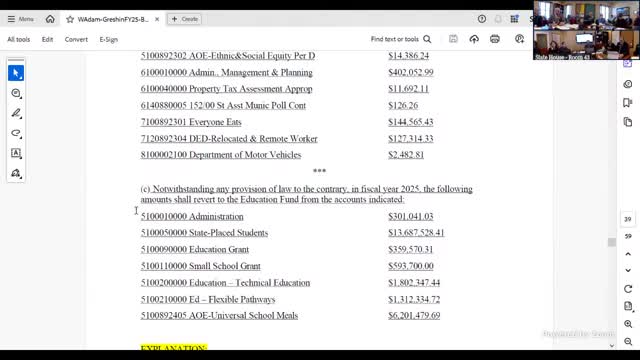Lawmakers say vehicle incentive programs have run out of funds; committee to seek $4 million carryover and hold EV program briefing
Get AI-powered insights, summaries, and transcripts
Subscribe
Summary
A committee member told the House Transportation Committee on Jan. 17 that the state’s vehicle incentive programs have exhausted funds and that they will ask the committee to request a $4 million carryover to sustain the programs through June.
A committee member told the House Transportation Committee on Jan. 17 that the state’s vehicle incentive programs have exhausted their funds and that they will ask the committee to request a $4 million carryover to sustain the programs through June.
"I'm gonna be putting, for consideration by the committee, a request for $4,000,000 to carry over the vehicle incentive programs," the committee member said, noting the agency (AOT) had requested the same amount to extend incentives until July 1.
Committee members described the incentive programs as popular and credited them with helping low- and moderate-income Vermont residents access more fuel-efficient and electric vehicles. One member said previous program flexibility and rapid disbursement reflected an intentional choice to get incentives into the marketplace quickly. "It was a chosen path to get as much incentive money out as quickly as possible," a committee member said, noting the committee had previously authorized flexibility to move money between programs to speed distribution.
Lawmakers also discussed the expectation of outside funding that did not materialize. A committee participant said last year’s budget had anticipated a large federal grant (referred to in committee as "almost a $100,000,000"), which did not arrive, and that earlier federal ARPA funds had been converted to state funding in order to expand the programs—described in committee as roughly $22,000,000 moved into state funds.
Damon Leonard of the Office of Legislative Council explained a common point of confusion: federal tax credits for new and used electric vehicles differ from direct state grant programs and are delivered through tax filings unless dealers are IRS-registered to apply the credit at point of sale. "There
re often a lot of confusion about what's what and when does the money come," Leonard said.
Committee members expressed concern about the operational impact of funding interruptions on dealers and residents, and about the risk of the programs starting and stopping. "It becomes, transparent, when the dealers are on board and you come in and you're looking for high efficiency vehicle," one member said, arguing that interruptions would undermine program effectiveness and consumer confidence.
To provide background, the committee scheduled a briefing for Tuesday with Patrick Murphy, AOT liaison who previously ran the agency's electric vehicle program, followed by testimony from Ross McDonald, who oversees public transportation at the agency. Members also raised separate concerns about potential GMT service reductions and said they want to explore whether the Budget Adjustment Act could be used to mitigate transit cuts.
The committee did not vote on the $4 million proposal during the session; the member said formal language requesting the carryover would be drafted and submitted for committee consideration and for appropriations as needed.
Next steps for the committee include the scheduled informational briefings on the EV program and public transportation and drafting a committee memorandum or letter to appropriations addressing the carryover request and any short-term transit needs.
